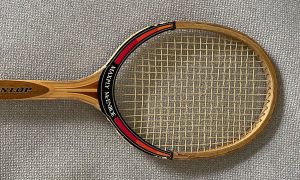
It’s that time of year when things rush up on you. “What, unlike the rest of the year?” I hear you ask somewhat sarcastically. OK, things are always rushing up on you, but at this time of year it’s particularly acute.
I’m talking specifically about sporting events. No sooner is the football season over than all the other sports rush in to fill the vacuum. The Derby, The Masters, The Ashes… and next up, The Wimbledon. Or Wimpleton, as Pete Sampras used to call it. You would think, after winning it so many times, he might have just once paused to read the engraving on the trophy and realised his mistake.
Anyway, we’re not here to explore the inner workings of Wimpleton champions, we’re here to discuss the word racket – a word so inextricably associated with tennis that if you took it away the game would break down completely. The question is not so much why a tennis racket is called a tennis racket – we all know that it comes from the French racquet, and wherever they got it from is really none of our concern. What we really want to know (don’t we?) is why the same word means a commotion or an organised criminal activity.
If you go back to 16th century, you’ll find all sorts of things going on. Henry VIII, Elizabeth I, the Armada, Shakespeare… and amidst all this drama came the word racket, in all its definitions. It was a time for making up new words and Shakespeare was the master of it, but it seems everyone liked to have a go. From this century we discover the first use of the word racket in both the sporting sense and the commotion sense. And sometimes both, depending on who was playing. You can imagine an Elizabethan McEnroe kicking up a racket and throwing his racket.
But the commotions from which the word ‘racket’ evolved seem to have been not the petulant outbursts of irate tennis players but deliberate public disturbances perpetrated by pickpocketing gangs to create a distraction while they carried out their nefarious activities. Pickpockets in Tudor times didn’t draw the line at strolling around singing jaunty songs about going to Timbuktu and back again, they used to cause a right old racket in the street by letting off firecrackers, and while their mark was clutching his breeches and hopping about trying to keep his wig on, they’d move in a clean up.
It became so bad that a law was passed prohibiting the letting off of firecrackers in public places. It’s a law that still stands.
If you had to recreate the noise made by a bunch of firecrackers, “racket racket racket racket” wouldn’t be a bad approximation. This is where the word is thought to have come from – good old onomatopoeia. And because of its association with criminal gangs, it soon came to mean a criminal activity. No one much used it, though, until it colonised America, gathered popularity during Prohibition and was shipped back to Blighty with the GIs during WWII.
And so we come to this time of year, this time when things rush up on you, and all the old questions are resurfacing. But now you know there is nothing linking the rackets at Wimbledon with the wrong kind of racket. That is, unless Cliff Richard gets on the mic again.


